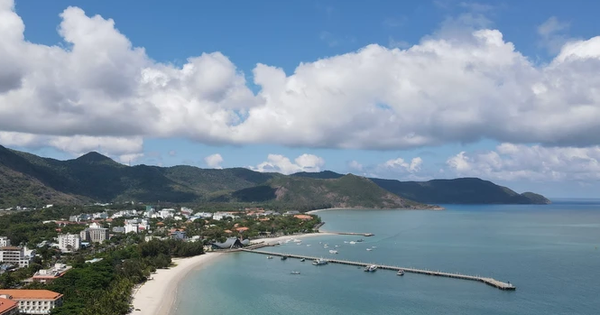 Life & Style
Life & Style

 |
| Localities such as Côn Đảo in Bà Rịa-Vũng Tàu Province are minimising the use of single-use plastic products in tourism and service activities. — VNA/VNS Photo |
BÀ RỊA-VŨNG TÀU — Many localities have developed strategies and action plans to raise awareness about environmental protection and promote tourism while implementing measures to reduce plastic waste.
The National Tourism Development Plan for Việt Nam for the 2021-30 period, with a vision to 2045, identifies marine and island tourism as one of the main product lines.
Sustainable tourism development is closely linked to environmental protection and effective climate change response.
By 2030, all tourist areas, accommodations, and other coastal service businesses will no longer use single-use plastic products and non-degradable plastic bags.
Phú Quốc in Kiên Giang, a famous tourist destination in Việt Nam, welcomes about 5.5 million visitors annually.
Along with its advantages in marine and island tourism resources, Phú Quốc also faces many challenges related to developing green tourism while protecting the environment and reducing plastic waste.
According to Phú Quốc City’s People's Committee, the city is determined to develop its economic sectors, including tourism, in a green and sustainable direction.
It aims to completely ban the use of single-use plastic products in tourist areas, coastal services, and night markets by 2025.
Additionally, 80 per cent of areas within Phú Quốc Marine Protected Area will be free of plastic waste.
Nguyễn Thị Mỹ Quỳnh, from the World Wide Fund for Nature in Việt Nam (WWF-Việt Nam), stated that the organisation, in collaboration with relevant agencies and Phú Quốc, is implementing the project "Phú Quốc towards a Plastic-Free Island".
The project has initiated many practical activities, such as a communication programme to raise awareness among residents, businesses, and tourists about environmental protection and plastic waste reduction.
Environmentally friendly bags are provided at hotels and resorts for guests to use while shopping, and green collection points for waste have been established, contributing to the goal of keeping Phú Quốc green, clean, and beautiful.
Similarly, Côn Đảo District in Bà Rịa-Vũng Tàu Province, an impressive marine and island tourism destination for many visitors, is pursuing sustainable socio-economic development, with a focus on green and environmentally friendly tourism growth to become a high-quality destination.
The People's Committee of Bà Rịa-Vũng Tàu Province has launched a project titled "Research and Application of the Circular Economy Model for Sustainable Socio-Economic Development of Côn Đảo District, period 2022-2025, with a vision to 2030".
Various activities are being implemented in Côn Đảo, such as raising awareness of environmental protection among residents and tourists, training on waste separation at the source, and tourism associations and transport companies signing commitments to reduce plastic usage in service operations.
The People's Committee of Côn Đảo District, in cooperation with WWF-Việt Nam, has distributed hundreds of waste sorting guidebooks and waterproof recycled fabric bags to tourism service businesses.
They also encourage tourists to participate in the "Green Offering Basket" initiative, which reduces the amount of plastic waste and non-degradable bags generated.
The Côn Đảo National Heritage Conservation Centre has implemented a model of "No Plastic Bags at Hàng Dương Cemetery," while the Côn Đảo National Park Management Board has organised numerous waste collection campaigns, handling marine waste at eco-tourism sites and beaches.
Practical actions
To succeed in developing green marine tourism linked to sustainable environmental protection, it is essential not to stop at just communication or pilot models but to require the voluntary and persistent efforts of every resident, tourist, and service provider through practical actions.
Võ Thanh Mỹ, deputy chairman of the Bà Rịa-Vũng Tàu Tourism Association, stated that the association is intensifying communication efforts and urging the tourism business community to actively apply the circular economy model in Côn Đảo, minimising the use of single-use plastic products in tourism and service activities.
Currently, many accommodation facilities and service providers in Côn Đảo are actively sorting waste at the source and gradually reducing the use of single-use plastic products.
A representative from Nicobar Hotel in Côn Đảo shared that the hotel has reduced the use of single-use plastic products in the delivery of many services to guests, replacing plastic water bottles with glass bottles, amounting to around 100 bottles per day.
The hotel also provides guests with small, refillable glass bottles for shampoo and shower gel.
Similarly, the Secret Côn Đảo Hotel uses an RO water filtration system to supply water to guests in glass bottles instead of plastic ones and uses environmentally friendly, biodegradable trash bags.
The hotel has also invested in a solar energy system with a design capacity of 65kW per hour, helping to save electricity.
Six Senses Côn Đảo Resort aims for "no plastic waste", and is equipped with a water filtration system to produce drinking water, avoiding the use of single-use plastic bottles. — VNS




